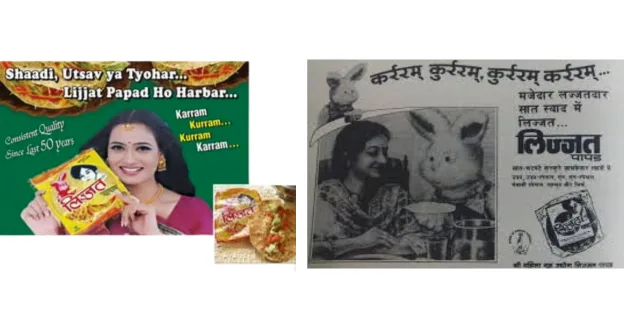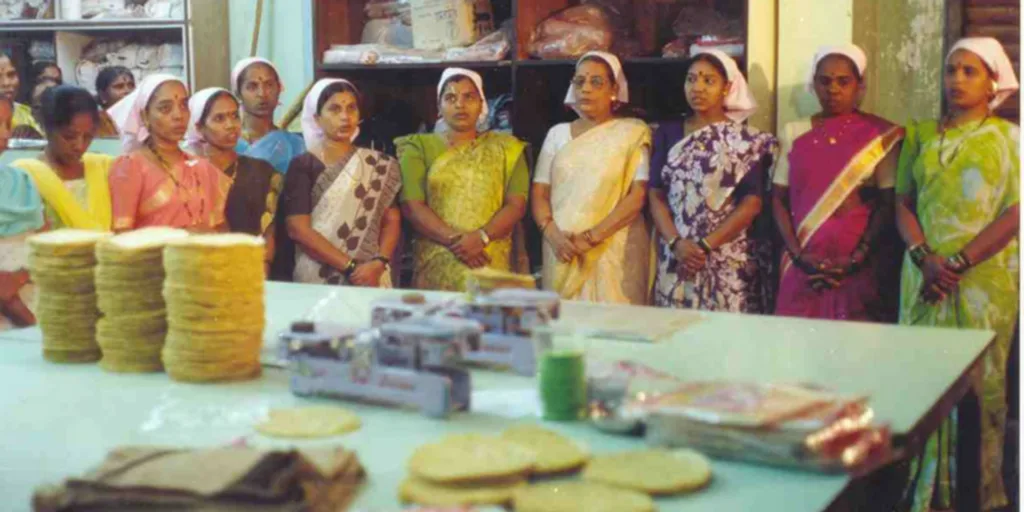Lijjat Papad Story: The Women Behind the Crunch
Table of Contents
Ask any Indian who grew up in the ’80s or ’90s about Lijjat Papad, and you’ll likely see a smile spread across their face. For many, Lijjat wasn’t just a snack; it was a part of family meals, weddings, and everyday moments. It reminds us of the simplicity of our childhood, where breaking papad during a meal was almost a kind of ritual.
Beginnings in a Tiny Room
The story of Lijjat Papad begins with seven spirited women in a small room in Girgaum, Mumbai, in the late 1950s. They had a simple dream, to earn a little money and support their families. But they didn’t have much, they borrowed ₹80 from a social worker named Chhaganlal Karamsi Parekh, a few utensils. Their initial output was four packets of papad.
It started with the desire to contribute to their household without leaving the home. Back in the 1950s, the opportunities for women, especially from lower-income backgrounds, were limited. These seven women, however, were determined to carve out their own path. They chose something familiar, making papads, a snack that was already part of daily life in Indian homes.
Under the guidance of Chhaganlal, the women began selling their homemade papads to local shops. People loved them! Word spread quickly, and soon, the local shopkeepers wanted to buy their papads in bulk.
This success helped the women expand, Even though they didn’t have business experience, the women had their values straight. They knew what mattered most:
- Empowerment over profit: Their goal wasn’t just to make money but to uplift women and their families.
- Sisterhood: Everyone was family. They called each other “ben,” which means sister in Gujarati. This sense of belonging made the work feel like home.
- Job security: No one would ever be fired. Every woman’s livelihood was just as important as making the business work.
- Uncompromising quality: Every papad had to go through a grade check to ensure it met the required standards.
This commitment to their values gained attention, and soon enough, Lijjat Papad received media coverage in local newspapers. What started with just seven women quickly grew into a cooperative. They named their venture “Shri Mahila Griha Udyog Lijjat Papad.”

From a Few to Thousands
By the end of their second year, Lijjat Papad had grown from seven women to 300! In 1966, Lijjat Papad was officially registered as a society under the Societies Registration Act of 1860 and recognized as part of the “processing of cereals and pulses” industry under the Khadi and Village Industries Act.
Led by Jaswantiben Popat, the women continued to scale their operations, staying true to their roots. They didn’t want handouts—they wanted to work and contribute, while maintaining their roots. The cooperative’s motto, Sarvodaya (upliftment for all), was a reflection of this spirit.
Lijjat also took steps to support the personal growth of its members. In the 1980s, they launched literacy programs to educate the women in the cooperative. They also created scholarship programs for their daughters and even invested in building recreational centers and improving rural infrastructure for the communities they lived in.
Turning a kitchen operation into something bigger came with its own set of challenges—sometimes they ran out of supplies, and distribution wasn’t easy.
But they remained true to what they knew best, their core values. Every woman involved was not just a worker; she was an equal partner in the business. This co-ownership model meant that each woman was invested in making the best product possible. With time, they streamlined the production process, set up more production centers, and used a cooperative system to share profits and responsibilities.

Over time, they perfected the process, opened more production centers, and shared the profits. But even as they grew, their papads still tasted like they were made in a neighbor’s kitchen. Indian families loved that. Lijjat wasn’t just a brand; it felt like a friend.
Whether it was served alongside dal and rice, or simply enjoyed as a crunchy snack, Lijjat Papad became a staple in homes across India. Housewives knew they were buying something made by women just like them, with the same love and care they put into their own cooking.
While Lijjat Papad is a thriving business today, its biggest success was what it did for women. At a time when most women didn’t have many options, especially from lower-income backgrounds, Lijjat gave them a chance to earn without leaving their families behind.
The cooperative model meant that every woman was an equal partner, with a voice in how the business was run. This sense of ownership provided them with a new sense of pride, not just as breadwinners but as businesswomen shaping the future of their communities.
What started in a small kitchen in Girgaum is now a global brand
From that small kitchen in Girgaum, Lijjat Papad has grown into a ₹1,600 crore business that now employs over 45,000 women. Its papads are exported to countries like the U.S., UK, and the Middle East.
Over the years, Lijjat Papad has been celebrated for empowering women in amazing ways. In 2016-17, they won the Mahila Vikas Award for the incredible impact they’ve had on improving the lives of women. Anita Parikh, one of the inspiring women behind Lijjat, also received the Empowerment of Women Award, recognizing how much she’s helped lift others. They even got a special visit from the Chairman of Mars Inc., one of the biggest food companies in the world—who was impressed by how Lijjat runs their business and supports women. In 2012-13, Lijjat Papad was recognized as the Best Village Industries Institution. On top of that, Lijjat earned the Entrepreneur Award, proving they’re true leaders in women-led entrepreneurship.
Recognized by the United Nations for its extraordinary contribution to women’s empowerment, Lijjat has shown the world what’s possible when people come together for a common cause. Representatives from the cooperative have even participated in UN summits on women’s and children’s health and literacy.
While papads remain the heart of Lijjat’s business, they’ve expanded their products over the years. Today, Lijjat’s product range includes Dhokla, Thepla, Masalas, Gahu Atta, Chapati, and Detergent.
The story of Lijjat Papad is a reminder that big dreams often start small. With just ₹80, seven women created an empire. But it was more than business—they built a community, a sisterhood, and a path for thousands of women to rise.






